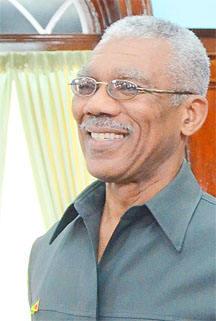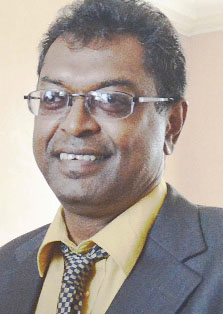A bail-out budget was how the opposition parties de-scribed the Donald Ramotar administration’s $192.8 billion budget yesterday and Opposition Leader David Granger said it lacks vision and does not cater to the needs of the poor.
Finance Minister Dr Ashni Singh announced $6 billion for the Guyana Power & Light Company (GPL) and another $4 billion for the Guyana Sugar Corporation (GuySuCo), both state entities that have been struggling for years even though they are expected to be self-sufficient.

“… It is clear that there is no vision in the budget. There is going to be no change. There has been no attention to the plight of the poor,” Granger told reporters minutes after Singh ended his almost three-hour presentation.
He said there is nothing in the budget for the development of human potential and that is the only way the country is going to be transformed.
“The honourable minister called a lot of numbers; monies have been spent. The budget is the largest in the history of the country but we do not see at the centre of that budget, the development of education, the development of human resources and the removal of a large number of our people from poverty,” Granger said.
According to Granger, “there is no way” the country can develop with a budget such as the one announced by Singh, and he added that it is “continuity at its worst.”
There was need, he said, for new vision, but that was not included and he called the $10,000 increase in the income tax threshold a “palliative measure” and one that would not bring about change.
Chairman of the AFC Khemraj Ramjattan said the budget was a “massive disappointment” for the party in the sense that the value-added tax (VAT) reduction that was needed did not happen and there was no increase for public servants. There was also nothing for cane cutters and while there was an income tax threshold increase, Ramjattan said that it does not compare to the increased cost of living that Guyanese have.
“We had really catered here for a reduction of the taxes, value added especially. We had really thought that there was going to be public servant increases but there was none,” he said.
Ramjattan also criticized government’s pushing so much money into infrastructure works without the mechanisms to ensure that quality work is going to be done with the necessary good fiscal governance.
He added that nothing Singh said gives the impression that there will be the setting up of the needed Public Procurement Commission this year, while noting that there will be $50 billion or more in infrastructural work and massive tendering out, with which the government has not had a good track record.
Turning to the money earmarked for GPL and GuySuCo, Ramjattan said it was a “bail-out budget; bail out for the incompetence that they exhibited in… the running of these two corporations… And the fellas get promotion one turn president and the other one turn minister.”
‘Severe disappointment’

The first reaction from former Finance Minister and now front bencher Carl Greenidge was “severe disappointment,” since he said the public expected that the government would have done something comprehensive on the tax front.
Greenidge referred to a 2008 USAID report which made some recommendations as regards changes in the tax structure. While the raising of the income tax threshold is welcome, he said, given that nothing has been done with regard to VAT and the insignificance of the increases in public assistance and old age pension, something substantial in the area of public service emoluments was expected. “When you bear in mind that it is this very government which had promised last year that it would do so much to turn around sugar for example; a promise that it had nothing to do with the politicization of the sugar industry… And today they come back to tell us [$4 billion] to the sugar industry and a substantial amount to GPL in addition to increasing the tariffs of people in Linden and those in Kwakwani,” he lamented.
Greenidge said those are the major measurements of the government at a time when it is boasting of doing better than it has ever done before and there has been no reference to poverty.

The PPP/C government, he said, has a Poverty Reduction Strategy Programme (PRSP) which it has been running since 2002 and which calls upon it to direct social expenditure to the poorest and the most vulnerable people in the country.
“That PRSP was practically abandoned in 2006 and it was replaced or put in tandem with the initiative in respect to the competitive strategy. Today when you look at the programmes the minister offers, there is nothing there targeted in any substantive way to the depressed communities and to the poor.
“This is shocking at a time when you are arguing revenues are increasing in terms of the overall revenues collected whether it is from VAT or other revenue sources. You cannot find a few million or a few hundred million to pay those that are most vulnerable?”
Further Greenidge posited that it was a “serious indictment” on the administration that it failed to use its imagination and skills to try and deal with the more pressing problems. Singh, he said, seemed more focused primarily on spending and he added that it is a “fantastic thing” that the minister gets so much delight in explaining how much is being spent with no attention to the impact of the expenditure.
“Yes they are spending a whole set of money on education but it is also the case that completion rates are very low. You are spending a whole set of money on health and you have problems in respect of life expectancy rates, in respect of the very young and problems in terms of nursery and primary school enrollment,” Greenidge pointed out.
He stressed that the minister cannot just look at how much money is being spent, he must look at effectiveness, as the gap between what the government is spending and how it helps or how it doesn’t help the public lies in the arena of bad procurement, corruption and the absence of a Procurement Commission, among other things.
The problem also lies in the failure of the government to build a competent technical administrative system. He said each year there is talk about new things coming on stream but the following year no report is made on how effective the programmes were and which communities have benefited.
“Imagine you have over 10,000 people coming into the labour force each year and the minister’s policies… focus primarily on 250 people here, 800 people there, 200 there and in one instance he mentioned 1,000. But these numbers…are often over two, three, five years periods and these cannot make an impact on poverty…”
There is need, Greenidge said, for focus to be placed on projects that raise income by increasing investments and paying attention to the poor.
The big issue of solid waste management in the city and the rising number of destitute people on the road did not seem to be an issue for the government, Greenidge contended, adding that if an underclass is built it is impossible to eradicate it.
‘Poor’
Weighing in, trade unionist Lincoln Lewis told Stabroek News that the budget is “very poor,” pointing out that budgets are about programmes and therefore he expected the issue of lower electricity rates to be addressed but instead an increase has been announced. He said he expected the minister to deal with the US$2.6 billion investment for the Amaila Falls hydro project but that was not done.
“We are now asked to pay a 20% increase on electricity. I don’t care when was the last time it was increased! The question here is that we are talking about something in excess of $2billion and I would have expected that the minister would have dealt with here,” Lewis said
And he said while the income tax threshold has been raised, consumers are still burdened with the 16% VAT, which suck any increase on salaries that might come as a result of the raised threshold. He said there is need for a living wage to be addressed and that is what the government has failed to do.





